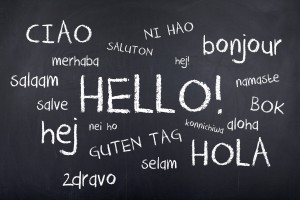
In 1952, a group of students from three different universities in Bangladesh came together to demonstrate for the recognition of Bangla or Bengali, the language native to Bengal. Just a few years before, the government had declared Urdu as the national language of Bangladesh, even though about 54 percent of the citizens were Bengali. The protest began peacefully, but it quickly turned violent. Because it violated a law in Bangladesh, the police were called. Many students were killed during the day, although exact counts are not available.
Two years later, the constituent assembly granted official status to Bengali, but it wasn’t until 1956 when the matter was completely settled. Today in Bangladesh, February 21, the day the students died, is celebrated as a national holiday known as Language Martyrs’ Day. In 2000, UNESCO commemorated the day by recognizing it as International Mother Language Day.
Bilingualism in the United States
Some studies estimate that about half of the world’s population is bilingual. In the United States, that figure is about 20 percent, although it is increasing as school systems and students understand the importance of speaking another language. States along the border, such as California, Texas, and Arizona, have more citizens who speak dual languages than states located in the middle of the country, such as Kentucky or West Virginia.
Sadly, many states have attempted to enact laws that make English the primary language. While this can make government roles easier, it also seems to elevate English and make it unacceptable to speak another language. UNESCO wants to remind people that languages preserve our heritage. People who are bilingual have dual cultures and traditions to remind them of the diversity of the world. Having the ability to compare two languages increases the awareness a person has of his or her own first language.
International Mother Language Day is not to celebrate English, Spanish, or whichever language someone speaks, but it celebrates the diversity of languages and the preservation of all languages. In America, many immigrant languages are disappearing. Very few people speak Yiddish, Greek, or Italian. There are some Native American languages that are dying out because they aren’t being taught to newer generations.
Celebrating Language Diversity
Each year, UNESCO chooses a theme for the day. In 2015, the theme was “Inclusive Education Through and With Language – Language Matters.” The United Nations wants people to know that language development and education helps everyone contribute to a positive society. Values can be passed down through language to strengthen the community.
Instead of making people feel bad for not speaking in your own tongue, take time to learn to say hello in a different language. You don’t have to be a young child to take a class to learn conversational Spanish or Korean. Learning the language of your own mother tongue keeps your brain active, which is said to promote good health as you age.
In the United States, those who want English to be the national language consider it patriotism to maintain one national tongue. What they fail to remember is that the world is becoming smaller. In today’s business world, someone may do business with people all over the globe. Knowing another language lets a person appreciate a mother tongue while opening doors to relate to others who are trying to learn English as a second language.
In 2008, President Obama made the suggestion, “You should be thinking about …. how can your child become bilingual. We should have every child speaking more than one language.” More parents are becoming part of the trend to increase their children’s awareness of more than one culture. Bilingualism offers an advantage in today’s business world. One that more people should be using, not just to build an empire, but to build community.

